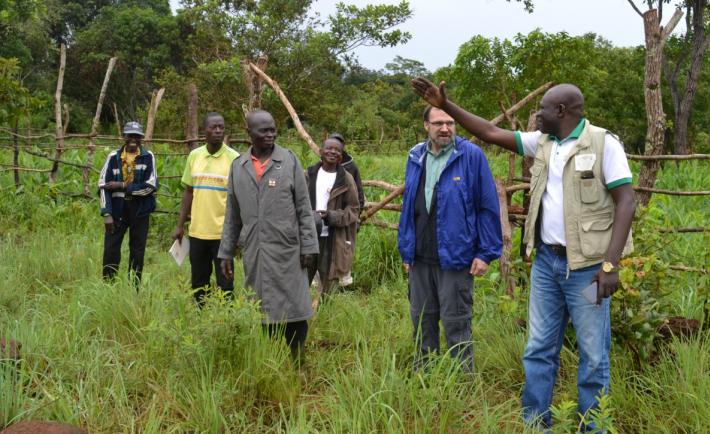
Alain Kinzinguere of NDI partner the Central African Human Rights League (right, gesturing) discusses the benefits of a community-built stockyard (background) with the village chief of Damara (left center in coat).
For more than a year after President Faustin Archange Touadera’s surprise runoff victory, the Central African Republic has been consolidating its nascent democratic institutions, including new ones called for in the 2015 constitution. These include a Special Criminal Court to investigate crimes committed by armed groups since 2003, a new High Authority for Good Governance and other bodies. In contrast with previous governments and legislatures that resulted from flawed elections, no elections, or coups d'etat, Mr. Touadera and the elected National Assembly appear to enjoy popular legitimacy—for now.
This legitimacy, however, is now undergoing its first serious test. A recurring theme I heard from Central Africans during a recent visit is that they expect their political leaders and the international community to put an end to the rising violence committed by armed groups in 14 of the country’s 16 provinces. Moreover, they reject compromises that would legitimize the armed groups’ actions and mistrust promises of disarmament. Indeed, shortly after discussions on the disarmament, demobilization, reinsertion and reintegration (DDRR) process began in April, attacks on government and U.N. forces, civilians and rival armed groups intensified, displacing hundreds of thousands of persons. This likely reflects efforts by armed groups to maximize their territory and leverage not only for the DDRR process, but also against rival groups.
Central African military forces are slowly being reconstituted, but with only one battalion that has been certified as trained, cannot defend the population by themselves. Even the MINUSCA forces, who earlier this year stopped sectarian fighting in Bambari, would be challenged to track down and defeat a plethora of armed groups in a territory the size of Texas. The challenges have led some observers to conclude that without robust investment in, and stronger military action by, MINUSCA, no peace agreement will be sustainable. Nevertheless, multiple proposals for peace talks reflect national and international leaders’ desire to put an end to the conflict and to claim credit for doing so: the National Assembly, the Community of Sant’Egidio and the African Union have each announced a peace initiative in the last six weeks, and these in addition to the ongoing DDRR discussions launched in April.
Armed groups reportedly seek amnesty for their crimes, the return of exiled leaders, and positions in a power-sharing government. Agreeing to such terms would run counter to the popular will, as expressed at the Bangui Forum, and violate key features of the new constitution, which strips those who take up arms of political eligibility (Art. 19-20). The Sant’Egidio accord, for example, would allow armed groups to become political parties—an event the constitution anticipated and deliberately prohibited (Art. 20). The National Assembly’s recent resolution, on the other hand, indicates that the legislature will not sanction a peace agreement if it violates any constitutional provisions.
Meanwhile, citizen-led efforts to restore peace, heal divisions, and build resilient communities show that conflict in CAR is not inevitable. The National Democratic Institute has been supporting citizen-led peace and reconciliation activities there since 2014. Its Central African partners have helped 46 communities establish peace committees whose local initiatives have led to communities welcoming the return of IDPs and of state officials. These communities report that they are better able to resist the divisive tactics used to instigate or justify further conflict, such as spreading false rumors about sectarian attacks nearby.
Amid these optimistic signs, the fragility of CAR’s democratic institutions remains a top concern. Peace committees may build resilience, but this cannot itself stop aggression by new armed groups. Politicians worry that while the CAR currently lacks the means to defeat armed groups, compromising with them could undermine the country’s recent democratic gains. Leaders’ commitments to preserving these gains are likely to be severely tested in the coming months.
